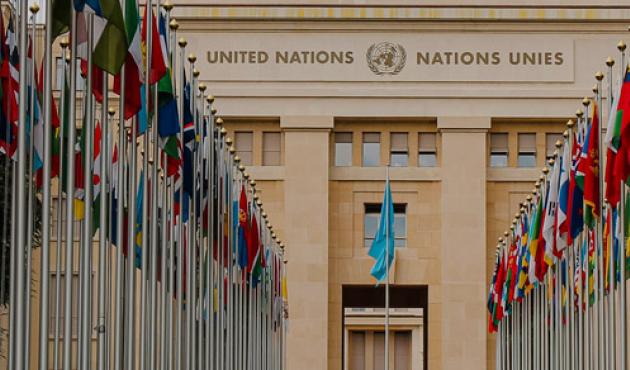Leading the way for a healthy climate
Climate change is undoubtedly one of the gravest challenges humankind has ever faced. The fabrics of natural ecosystems and our societies are beginning to unravel from the devastating impacts of climate pollution. This crisis presents an unparalleled threat to our health and well-being. It also presents an opportunity for transformative systems change.
Whether treating respiratory disease from fossil fuel or wildfire pollution or protecting hospitals from floods, health care providers are first responders to these climate emergencies. Yet, health care’s climate footprint is also a significant contributor to this problem, with 4.4% of global net emissions. Health care’s most potent message is to lead by example–cutting emissions quickly and building climate resilient health systems.
By working together, we can embark on a road to recovery that’s healthier, more equitable, and more resilient for people and the planet. Health leaders can implement transformative solutions to prevent fossil fuel pollution and prepare systems and facilities for climate impacts.
We must act fast and we must act first.
Whether you’re a health minister, CEO of a private health institution, or a health professional, Health Care Without Harm provides guidance, and resources on decarbonizing, bolstering resilient health systems and demonstrating leadership. We seek to enable health care to fulfill its mission to do no harm while providing more equitable access to care.


More than 100 health care institutions representing over 15,000 hospitals and health centers joined the Race To Zero.

Country commitments to strengthen the climate resilience and sustainability of their health systems.

Achieving zero emissions, climate resilience and health equity


Country commitments to strengthen the climate resilience and sustainability of their health systems.
The call for submissions for the 2025 Health Care Climate Challenge awards is now open.
Since its inception in 2015, the Climate Challenge has played a vital role in mobilizing health care institutions worldwide to take impactful climate action.
Together, they committed to reducing their greenhouse gas emissions by an equivalent of 1.4 million gasoline-powered passenger vehicles driven for one year.
A few months ago, we proudly introduced our 2024 Climate Champions, a group of institutions leading the way in climate-smart health care. These visionary leaders are transforming health care with innovative solutions, reducing greenhouse gas emissions, and building community resilience.
Health Care Without Harm is proud to present its 2024-2028 International strategic plan, which addresses the interconnected challenges of climate change and health, and sets the course for the collective work of our international network.
For the ninth consecutive year, we have the privilege of recognizing outstanding health care institutions from around the world that are fully committed to adopting low-carbon health care practices, strengthening climate resilience strategies, and advocating for policies that prioritize the health of our planet.
Geneva, Switzerland, 31 May 2024 — In a significant move towards integrated global action, the Seventy-seventh World Health Assembly has passed a resolution addressing the critical intersection of climate change and health. Health Care Without Harm applauds this important step forward in addressing the health impacts of the climate crisis.
Climate change poses an undeniable threat to our planet and the well-being of future generations. As we witness its far-reaching effects, it's becoming increasingly clear that urgent action is required across all sectors, including health care. The importance of health care climate action cannot be overstated; it's not only about reducing carbon emissions but also safeguarding public health, ensuring resilience against climate-related disasters, and demonstrating leadership in sustainability practices.
Reston, VA (04/30/2024) – Health Care Without Harm released a global sign-on letter on Monday, April
29, 2024, urging negotiators of the Plastics Treaty to ensure an ambitious treaty that does not exclude
the healthcare sector. The letter is signed by close to 1,000 medical and public health individuals and
organizations, including the World Federation of Public Health Associations (WFPHA), the International
Federation of Medical Students Associations (IFMSA), the Global Climate and Health Alliance (GCHA), the
Plastics is a global health crisis hiding in plain sight. Throughout the lifecycle of plastic, from production to disposal, a wide array of toxic chemicals and microplastics pose risks through inhalation, ingestion, and skin contact. Communities, health workers, and health systems are already witnessing the detrimental impacts of plastic production and pollution.
While the health care sector's primary mission is healing, it paradoxically contributes to the climate crisis as one of the main greenhouse gas (GHG) emitters.
Health professionals possess a diverse and expansive role, with the power to influence policy, challenge social norms, and drive transformative change. Drawing from a rich history of advocacy, they are uniquely positioned to address pressing issues through the lens of public health and disseminate critical information to the broader public.